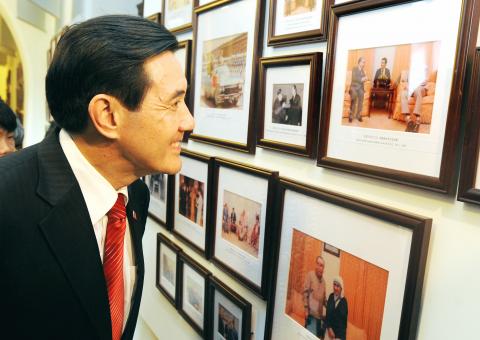President Ma Ying-jeou (馬英九) yesterday said the Republic of China (ROC) has had sovereignty of Taiwan since 1943, when Japan “agreed” to give the ROC government claim to Taiwan proper and the Penghu Islands.
While some argue that the Cairo Declaration of 1943 was little more than a press release, Ma said, in his view, the communique signed by the three leaders — ROC president Chiang Kai-shek (蔣介石), US president Franklin Roosevelt and British prime minister Winston Churchill — in Cairo should be treated as a “treaty” in international law.
Ma said it was a statement of intent by the Allied powers in World War II that, after the Japanese surrender, territory that Japan had “stolen” from China — including three provinces in northeast China, as well Taiwan and the Penghu Islands — would be “returned” to China.

Photo: CNA
The subsequent Potsdam Declaration of 1945 and Japan’s surrender document confirmed that the ROC had the right to resume sovereignty over Taiwan and the Penghu Islands, Ma said.
Ma made the remarks at the inauguration of the President and Vice President Records Museum in Taipei.
With the passage of time, Ma said, history becomes vague and some people deliberately change it to satisfy the needs of various agendas.
Citing a recent cross-strait controversy over which camp had led the eight-year war of resistance against the Japanese, Ma said evidence showed that it was the Chinese Nationalist Party (KMT) — not the Chinese Communist Party — that led the way.
Quoting former US president Theodore Roosevelt, Ma said it was important to preserve history so that the next generation would know what happened in their parents’ and grandparents’ time.
“To bring together the records of the past and to house them in buildings where they will be preserved for the use of men and women, a nation must believe in three things,” Ma quoted Roosevelt as saying. “It must believe in the past. It must believe in the future. It must, above all, believe in the capacity of its own people to learn from the past so that they can gain in judgment in creating their own future.”
Located behind the Presidential Office, the museum is housed in an 86-year-old Baroque-style historic building. Academia Historica, which took ownership in 2006, spent three years renovating the four-story building. Although the museum was opened yesterday to coincide with Double Ten National Day celebrations, the final remodeling on the fourth floor is not expected to be completed until March.

Japanese footwear brand Onitsuka Tiger today issued a public apology and said it has suspended an employee amid allegations that the staff member discriminated against a Vietnamese customer at its Taipei 101 store. Posting on the social media platform Threads yesterday, a user said that an employee at the store said that “those shoes are very expensive” when her friend, who is a migrant worker from Vietnam, asked for assistance. The employee then ignored her until she asked again, to which she replied: "We don't have a size 37." The post had amassed nearly 26,000 likes and 916 comments as of this

US President Donald Trump said "it’s up to" Chinese President Xi Jinping (習近平) what China does on Taiwan, but that he would be "very unhappy" with a change in the "status quo," the New York Times said in an interview published yesterday. Xi "considers it to be a part of China, and that’s up to him what he’s going to be doing," Trump told the newspaper on Wednesday. "But I’ve expressed to him that I would be very unhappy if he did that, and I don’t think he’ll do that," he added. "I hope he doesn’t do that." Trump made the comments in

Tourism in Kenting fell to a historic low for the second consecutive year last year, impacting hotels and other local businesses that rely on a steady stream of domestic tourists, the latest data showed. A total of 2.139 million tourists visited Kenting last year, down slightly from 2.14 million in 2024, the data showed. The number of tourists who visited the national park on the Hengchun Peninsula peaked in 2015 at 8.37 million people. That number has been below 2.2 million for two years, although there was a spike in October last year due to multiple long weekends. The occupancy rate for hotels

A cold surge advisory was today issued for 18 cities and counties across Taiwan, with temperatures of below 10°C forecast during the day and into tonight, the Central Weather Administration (CWA) said. New Taipei City, Taipei, Taoyuan and Hsinchu, Miaoli and Yilan counties are expected to experience sustained temperatures of 10°C or lower, the CWA said. Temperatures are likely to temporarily drop below 10°C in most other areas, except Taitung, Pingtung, Penghu and Lienchiang (Matsu) counties, CWA data showed. The cold weather is being caused by a strong continental cold air mass, combined with radiative cooling, a process in which heat escapes from